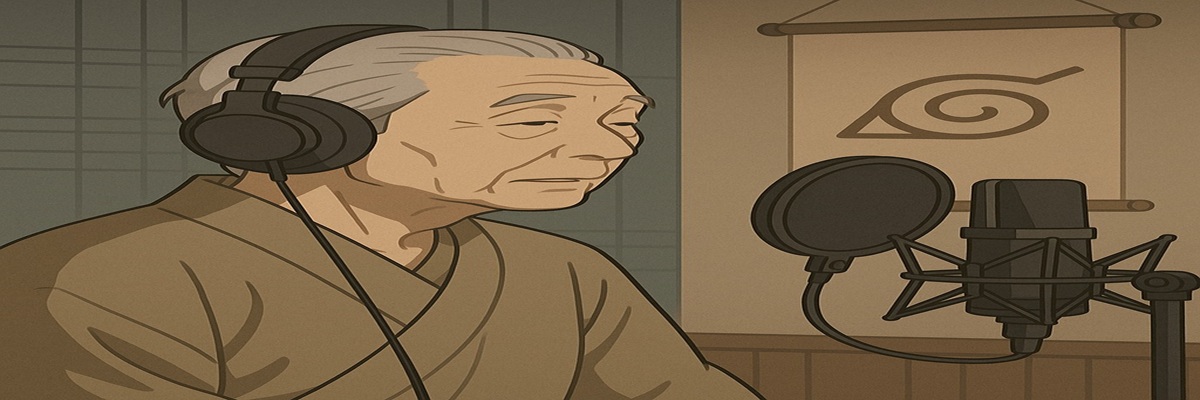The anime and voice acting industry has lost one of its most enduring talents. Ken Shiroyama, the celebrated Japanese actor and voice performer, has passed away at the age of 92. Known for his role as Ebizō in Naruto Shippuden and a long list of other characters spanning over five decades, Shiroyama leaves behind a legacy that reflects the growth, evolution, and international reach of Japanese voice acting.
His passing on April 15, 2025, was confirmed by his agency, Production Baobab. Though Shiroyama had largely stepped back from voice work in recent years, his impact remains deeply felt across generations of anime fans and fellow performers.
A Career That Paralleled the Growth of the Anime Industry
Ken Shiroyama was born on October 3, 1932, in Hokkaido, Japan — long before anime became a global phenomenon. His career began in the 1960s, during the early years of television animation in Japan, when studios like Toei and Mushi Production were beginning to define what would become the modern anime style.
Shiroyama’s first known work in voiceover was on Attack No. 1, a groundbreaking sports anime, in 1969. This marked the beginning of a prolific and varied career in both anime and film dubbing. As anime matured into a dominant cultural export, Shiroyama was right there with it, adapting his voice to match the evolving tone, character styles, and storytelling complexity that emerged through the decades.
He was often cast in roles that demanded authority, poise, or elder wisdom — not surprising given his vocal resonance and steady delivery. His performances often carried a quiet strength, making him an ideal fit for military leaders, teachers, and older advisors.
Portraying Ebizō: Giving Life to a Hidden Leaf Elder
Though Ken Shiroyama voiced dozens of characters, it was his portrayal of Ebizō in Naruto Shippuden that brought him international recognition among modern anime fans. Ebizō is introduced as the brother of Chiyo, both elders of the Hidden Sand Village and respected veterans of the Shinobi world.
The character of Ebizō required a measured, authoritative tone — one that conveyed wisdom, history, and the weight of loss. In Shiroyama’s hands, Ebizō became more than a supporting role. His restrained performance lent the character a solemn dignity, especially in scenes that dealt with war, generational conflict, and the cost of duty.
Fans of Naruto Shippuden often cite his scenes with Chiyo as emotional highlights of the series. While the younger cast drove much of the show’s energy and action, Shiroyama’s voice grounded the narrative in tradition and consequence.
A Voice That Traveled Across Genres and Borders
Ken Shiroyama’s career cannot be summed up by one role. Over the decades, he worked across genres — from classic mecha to supernatural horror, from children’s anime to adult-themed dramas. His range and adaptability made him a staple in recording booths well into the 2000s.
Notable roles beyond Naruto include appearances in:
-
Gatchaman – a foundational sci-fi series from the 1970s
-
Astro Boy – one of the earliest serialized anime franchises
-
Berserk – the dark fantasy epic known for its emotional depth and graphic storytelling
-
Trigun and Spriggan – action-packed series that reached wide international audiences
-
Strike Witches – where he again played a senior figure among younger characters
In each of these roles, Shiroyama adapted his style to suit the tone of the show, always with a focus on clarity, authenticity, and rhythm. His ability to elevate supporting characters made him a frequent casting choice for roles that required emotional restraint and narrative stability.
Bringing Western Characters to Japanese Audiences
Like many prominent Japanese voice actors of his era, Shiroyama also had a significant presence in the Japanese dubbing of Western films and animated series. He helped localize major American properties by voicing characters that required humor, gravitas, or eccentricity — often with no visual precedent in anime.
He is especially remembered for his work in:
-
Courage the Cowardly Dog – voicing Eustace Bagge, the grumpy, complex old man, with just the right balance of sarcasm and weirdness for Japanese viewers
-
Transformers – voicing multiple characters, including Perceptor, Trailbreaker, and Frenzy, in various iterations of the franchise
-
Live-action films such as Rambo and From Dusk Till Dawn, where his performances brought Hollywood action to Japanese audiences with a cultural sensibility that didn’t compromise intensity
This crossover work not only demonstrated his versatility but also highlighted the importance of skilled voice acting in the global exchange of entertainment. Shiroyama played a quiet but essential role in connecting Western media to Japanese viewers — and vice versa.
A Quiet Figure With a Resounding Influence
Ken Shiroyama was not a flashy or self-promoting figure. He rarely gave interviews and largely avoided the convention circuit that younger voice actors now frequent. Yet within the industry, he was known for his professionalism, precision, and humility.
In an age when voice actors are increasingly public figures, Shiroyama remained a working actor in the truest sense. Colleagues described him as steady, respectful, and generous — particularly to younger performers trying to find their place in a rapidly changing industry.
Even in retirement, his name continued to appear on tribute reels, anniversary events, and retrospectives focused on the evolution of Japanese dubbing. His death marks not just the loss of an actor, but the fading of a generation that helped build the foundation of modern anime voice acting.
A Legacy That Endures Through Storytelling
Although Ken Shiroyama had largely stepped back from the microphone in recent years, his voice continues to echo through reruns, re-releases, and streaming platforms. His performances remain accessible to a new generation of fans discovering these iconic series for the first time.
He helped shape a model of voice acting where character came before ego, and where subtlety could often be more powerful than theatricality. Whether voicing a shinobi elder, a cartoon villain, or a war-hardened soldier, he approached each role with the same seriousness and respect for the craft.
Honoring Ken Shiroyama’s Memory
As the anime and dubbing communities reflect on the life and contributions of Ken Shiroyama, the tone is not only of mourning — but of appreciation. His work touched thousands of scenes and millions of viewers. While his name may not have always been in the spotlight, his voice helped define how stories were told, how characters were understood, and how anime found its global voice.
In honoring him, we honor a foundational era in voiceover history. His roles may now belong to the past, but his legacy speaks clearly — and will continue to do so for years to come.

